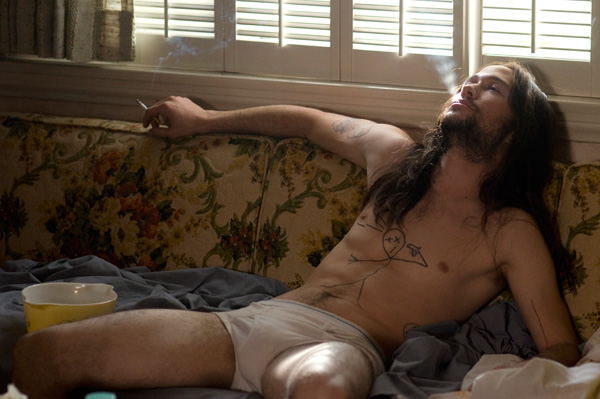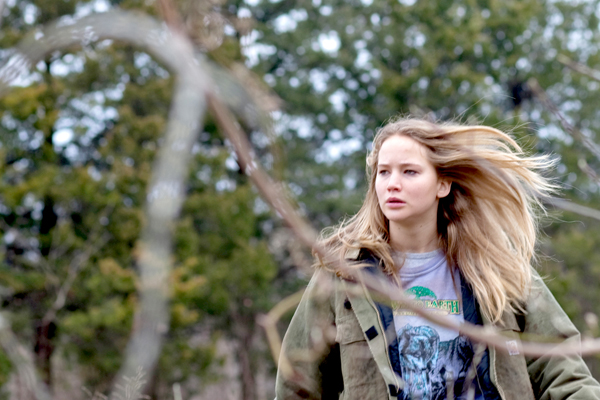|
Reviews of Recent Independent, Foreign, & Documentary Films in Theaters and DVD/Home Video

THE 2010 SUNDANCE FILM FESTIVAL A week of relentless snow hasn’t daunted attendees to the just-concluded Sundance Film Festival in Park City, Utah. This year’s fest marks a regime change, as longtime director Geoffrey Gilmore (who defected to Tribeca Enterprises early last year) has been replaced by his former right hand, John Cooper. This year’s fest is branded with a “re:” logo, heralding a reinvention in programming sensibility toward the redefined, revolutionary, and rebellious. Indeed, it’s a darker fest this year. Hesher, the year’s obligatory Joseph Gordon-Levitt picture (some things do remain the same), is a sometimes disturbing and, because of the title character’s dark worldview, always envelope-pushing tale of a struggling family, while Michael Winterbottom offers The Killer Inside Me, based on Jim Thompson’s pulpy noir novel. Casey Affleck painfully portrays Officer Lou Ford, a sociopathic mess of a small-town lawman whose homicidal tendencies foil even his most carefully laid plans. Winterbottom’s directorial chops are on display in this skillful mix of (extremely) dark humor, sadistic horror, and classic noir, though an eerie, persistent misogyny seems to fuel the more violent scenes. Be aware, there will be blood. Lovers of Hate, directed by Brian Poyser, also employs clever genre elements and a classic love triangle—two irritable brothers, one mostly naked wife—snowed in at a ski condo in, of all places, Park City. It’s one part comedy of errors, another part revenge story, all in the trappings of the mumblecore movement’s hand-held video aesthetic. Mark and Jay Duplass, two of that movement’s rising stars, have managed to have a hand in many of this year’s films. Mark was executive producer on Lovers, as well as The Freebie and Bass Ackwards, a smart take on the road movie written, directed, and starring another up-and-comer, Linas Phillips. The fest’s brand new “NEXT” section features exclusively low- and no-budget films, proving that good filmmaking can happen at all levels of financial support. Mr. Phillips’ film is a prime example of what the combination of one camera, a 1970’s Volkswagen bus, and several unknown but quite talented actors can offer. Phillips stars, presumably playing a character very similar to himself on an emotional road trip from Seattle to Brooklyn. Far from a low-budget production, but espousing the same hand-held, improvisational style is the Duplass Brothers’ Cyrus, starring John C. Reilly, Marisa Tomei, and Jonah Hill in a very different kind of love triangle. Hill plays Tomei’s live-in 21-year-old son who balks at her new choice of boyfriend. The boys are amazingly funny together under the adorable chaperonage of Tomei, but the best part of this much-improvised film is remembering that John C. Reilly is one of the most talented actors working in Hollywood, despite a recent foray into frat-boy, Will Ferrell-franchise comedy.
Armless is another NEXT selection, and tells the odd story of a man’s quest to have both his arms amputated. It’s one of a slew of dismemberment moments this year. 7 Days, a Canadian torture film directed by Daniel Grou, follows a meticulous surgeon who imprisons his daughter’s killer in order to inflict a righteous and sickening retribution. Grou poses a powerful question about revenge, asking whether continuing to add pain and suffering to the world is beneficial for the aggrieved. Winter’s Bone, one of the most talked about, takes place in the rural Ozark Mountains, and sees a teenaged girl (Jennifer Lawrence) on a mission to locate her bail-jumping, meth-cooking father. It’s chilling and deeply sad, but Lawrence’s performance is inspiring. Debra Granik and Anne Rosellini wrote this accomplished screenplay. Restrepo is one of a number of great documentaries. War correspondents Sebastian Junger and Tim Hetherington, after meeting on assignment for Vanity Fair, directed this visceral journey into the Korengal Valley, deep in the heart of wartime Afghanistan. They filmed the daily rounds of a combat unit based on a small outpost, nicknamed “Restrepo” after a recently fallen comrade, in one of the most deadly areas in the world. The unit sees fighting nearly every day, and Junger and Hetherington’s cameras are there, unflinching, for some of the most fascinating real-life war footage ever brought to the screen. Imagine “COPS: Afghanistan” and you’ll have a pretty good idea. Michael Winterbottom has another film in the fest, co-directing The Shock Doctrine with Mat Whitecross. It’s based on Naomi Klein’s excellent best-selling book of the same name, about the proliferation and the devastating effects of what she calls “disaster capitalism.” I hate to be the “book was better” parrot, but I’ve just got to mention it. Clips from Klein’s own lectures are an integral part of this doc and make up the most informative moments, despite the mountains of archival footage and persistent narration. Brazilian filmmaker José Padilha offers the doc Secrets of the Tribe. Warning of the dangers of anthropological study that threaten otherwise unaffected native populations, its attitude toward academia is sometimes anti-intellectual but always informative. International man of mystery Bansky had a surprise film this year, the documentary Exit Through the Gift Shop, that has been genuinely surprising audiences with revelatory footage from the deepest stretches of the underground street-art movement. Its depiction of one of the most sensational of those artists keeps the surprises coming until its unbelievable finale. Can this possibly be real? A Film Unfinished is another rediscovery of old material, this time in the form of a Nazi propaganda film shot in the Warsaw Ghetto shortly before the establishment of the death camps. One of the buzziest at the fest was Catfish, about filmmakers who unknowingly stumbled upon one of the most darkly fascinating discoveries they could have imagined. You won’t believe it until you see it. Among the World Cinema Dramatic selections, Contracorriente (Undertow) is a beautiful Peruvian film with rich details about a rigidly Catholic beach community and two men’s secret homosexual love affair within it. Javier Fuentes-León directs with an attention to both physical beauty (his scruffy actors and the beachfront setting are enchanting) and a smart social awareness (the two defy their close-minded friends and family with the relationship). The Man Next Door, an Argentine film by Mariano Cohn and Gastón Duprat about neighbors who battle over their common dividing wall, is one of the fest’s smartest, and insights into human nature abound. Nuummioq is certainly the first Greenlandic feature I’ve ever seen, if not the first ever produced? Actually, it is the first ever Greenland/Inuit production, and a fine one at that. A can’t-go-wrong setting out in the tundra provides the backdrop for a complex story about one man attempting to face the deaths in his past, as well as his own. Discomfort seems to be the name of the game this year.
Gaspar Noé is back with another piece of unrelenting provocation. From
last year’s Cannes Festival, Enter the Void shows us an
abortion, and, yes, even the inside of a vaginal passage, mid-coitus.
His intensely cerebral studies of decidedly instinctual behavior attack
viewers on several levels, and here he continues the practice. Eric
Mendelsohn’s 3 Backyards is off-putting in a very
different, personal way. Stylistically and morally, it’s one of the most
unique films here, with dynamic performances from Edie Falco and Elias
Koteas, who demand from audiences a kind of complicity in their
middle-class longing. A visual style and haunting score place the film
in a dream, or even an alternate reality, with vague yet powerful
similarities to everyday life. The suburbs are nests of desperate
plotting, and Mendelsohn quietly makes conspirators out of us.
Daddy Longlegs by Josh and Benny Safdie stars Ronald Bronstein
(2008’s Frownland), and is proof that cinema is certainly not
meant to merely entertain and pacify, but instead to incite, even though
the Safdies give us every reason to cultivate dissatisfaction with human
behavior, and provide, if nothing else, an interesting viewing
experience. “We hope you like it,” said Josh at the premiere, “or at
least that you react to it.” Is this overall discomfort a sign of the
new programming leadership, or of a much larger social trend? Perhaps
the release schedule will tell. Michael Lee
|


